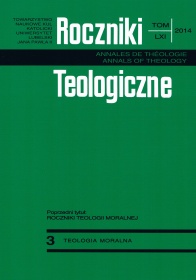Ectopic Pregnancy From the Bioethical Perspective
Abstract
One of the difficult cases the biomedical practice encounters is concerned with the ethical conduct with ectopic pregnancy (eccysis). The conviction is fairly common that ectopic pregnancy has to be terminated as soon as possible, as such an intervention gives avery good prognosis and allows minimizing the risk of maternal death. In urgent situations the developing embryo is removed by surgical intervention. In the case of early treatment of ectopic pregnancy methotrexate is used rather than surgery. In the practical dimension, however, such an action is directed against the embryo, effecting the destruction of it.
In the case of an early detection of such a pregnancy and the mother's good health it is also possible to refrain from immediate intervention and to wait and carefully observe the situation. This is because cases of an ectopic pregnancy ending in delivering a live and healthy baby are fairly common.
From the Christian point of view action directed immediately against the human fetus is excluded.
From the moral point of view detecting an immediately threatening rupture of the Fallopian tube or the cervix, usually after 7-10 weeks of gestation, is the most difficult. Removing the affected tissue or organ (or a part of it) where the embryo has implanted is morally acceptable. The source of threat to the mother is not the embryo, but the changes occurring in the tissue of the organ where it is developing. It is necessary to remove the tissue and it is the tissue that is the object of the surgical intervention. Terminating the pregnancy and the death of the baby is a side effect of the intervention that cannot be avoided. Such a surgical intervention is then assessed from the perspective of two classical moral principles: the holism principle and the principle “voluntarium indirectum” (an act with a double result). This interpretation is affirmed by statements of the Magisterium.
References
Bartel H.: Embriologia. Warszawa: PZWL 2007.
Ceriani G.: Aborto diretto o indiretto? Ai margini di una polemica tra Padre Gemelli ePadre Vermeersch. „La Scuola Cattolica” 62:1934 s. 79-86.
Ciąża ektopowa. W: Wielka Encyklopedia Medyczna. T. 4. Red. E. Cravetto. Warszawa: Editorial Planeta DeAgostini S.A. 2011 s. 123-125.
Ciąża o przebiegu nieprawidłowym. W: Położnictwo i ginekologia. Red. G.H. Bręborowicz. T. 1: Położnictwo. Warszawa: PZWL 2008 s. 77-182.
Eschbach A.: Casus de ectopicis seu extrauterinis concepibus de procuratione abortus. Romae: Drukarnia S. Joseph 1894.
Gemelli A.: De l'avortement indirect. Application à l'avortement des notions de causalité per accidens et de causalité indirecte. „Nouvelle Revue Théologique” [cz. 1] 65:1933 t. 60 nr 6 s. 500-527.
Gemelli A.: De l'avortement indirect. Application à l'avortement des notions de causalité per accidens et de causalité indirecte. „Nouvelle Revue Théologique” [cz. 2] 65:1933 t. 60 nr 7 s. 577-599.
Gemelli A.: Encore l'avortement indirect. Réponse au T.R.P. Vermeersch, S.I. „Nouvelle Revue Théologique” 65:1933 t. 60 nr 8 s.687-693.
Gennaro A.: Isterectomia. Liceità della estirpazione di un utero gravido canceroso. Note e documenti. Torino 1943.
Molly żyje! Dziecko z ciąży pozamacicznej urodziło się zdrowe. „Human Life International – Polska” (2006.08.07). Http://www.hli.org.pl/xoops/ modules/news/article. php?storyid=23)
Morciniec P.: Bioetyka personalistyczna wobec zwłok ludzkich. Opole: Wydz. Teologiczny Uniwersytetu Opolskiego 2009.
Morciniec P.: Etyczne aspekty transplantacyjnej terapii chorób neurozwyrodnieniowych. Studium teologicznomoralne. Opole: Wydział Teologiczny Uniwersytetu Opolskiego 2000.
Na przekór medycynie dziecko z ciąży pozamacicznej urodziło się zdrowe. „Puls pro-life” (03. 06.2008). Http://www.pro-life.org.pl/2008/06/na-przekr-medycynie-dziecko-z-cizy.html)
Otowicz R.: Etyka życia. Bioetyczny i teologiczny kontekst problematyki życia poczętego. Kraków: Wyd. WAM 1998 s. 147-184.
Skrzypczak J.: Ciąża ektopowa. W: Położnictwo i ginekologia. Red. G.H. Bręborowicz. T. 1: Położnictwo. Warszawa: PZWL 2008.
Słomko Z.: Ciąża ektopowa. W: Medycyna perinatalna. Suplement. Warszawa: PZWL 1994 s. 245-247, 259-266.
Speroff L., Fritz M. A.: Kliniczna endokrynologia ginekologiczna i niepłodność. Warszawa: MediPage 2007.
Vermeersch A.: Avortement direct ou indirect. Réponse au T.R.P. Gemelli, OFM. „Nouvelle Revue Théologique” 65:1933 t. 60 nr 7 s. 600-620.
Vermeersch A.: De causalitate per se et per accidens, seu directa et indirecta. „Periodica de re morali, canonica et liturgica” 21:1932 z. 2 s.101*-116*.
Wróbel J.: Człowiek i medycyna. Teologicznomoralne podstawy ingerencji medycznych. Kraków: SCJ 1999.
Wróbel J.: Kiedy ciało może przyjąć duszę. „W drodze” 1990 nr 3(199) s. 19-29.
Copyright (c) 2014 Roczniki Teologiczne

This work is licensed under a Creative Commons Attribution-NonCommercial-NoDerivatives 4.0 International License.





